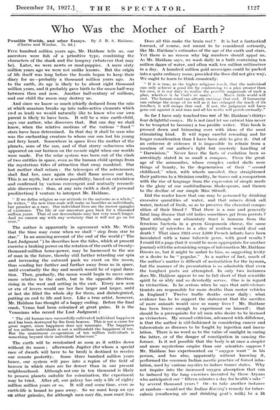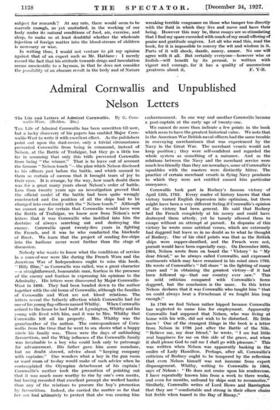Who Was the Mother of Earth ?
Possible Worlds, and other Essays. By J. B. S. Haldane. (Chatto and Windw3. is. 6d.) FIVE hundred million years ago, Mr. Haldane tells us, our ancestors were fish of a primitive type, combining the characters of the shark and the lamprey (whatever that may be). Later, we were newts or mud-puppies. A mere sixty million years ago we were not unlike lemurs. But the origin of life itself was long before the fossils began to keep their diary for us—probably a thousand million years ago. As to the earth, its age is likely to be about eight thousand
million years, and it probably gave birth to the moon half-way between then and now. Another half-century of millions, and our child the moon may destroy us.
And since we know so much (chiefly deduced from the rate at which uranium breaks up into radio-active elements which end as lead) we would naturally like to know who our Own parent is likely to have been. It will be a wise earth-child, says our author, who discovers that. But one day we shall know, when the relative motions of the various " fixed " stars have been determined. In that day it shall be seen who was the enchanting creature to whom our sun lost his young and fiery heart. Somewhere in space lives the mother of the planets, sons of the sun, and of that starry seductress who appeared on our horizon on the cosmic night when our worlds were made. For the solar system was born out of the clash of two entities in space, even as the human child springs from the mysterious tides of attraction that sway mankind. Our lost mother shall return : the telescopes of the astronomers shall find her, once again she shall flame across our ken. This is no myth, but a serious possibility, based on calculation and confirmed by various convergent and mutually reconcil- able discoveries : thus, at any rate (with a dash of personal predilection) I venture to interpret Mr. Haldane.
" If we define religion as our attitude to the universe as a whole," he writes," the new time-scale will make us humbler as individuals, but prouder as a race. Our individual lives are the merest spangles of existence. The life of our ancestors goes back for a thousand million years. That of our descendants may last very much longer. And we cannot say with any certainty that it will not go on for ever."
The author is apparently in agreement with Mr. Wells that the time may come when we shall step from star to star." In an amusing account of the end of the world (" The Last Judgment ") he describes how the tides, which at present exercise a braking power on the rotation of the earth of twenty- thousand-million horse-power, may be harnessed to the use of man in the future, thereby still further retarding our spin and increasing the outward push we exert on the moon, thus sending her further and further away from us in space, until eventually the day and month would be of equal dura- tion. Then, gradually, the moon would begin to move once more relative to the earth, but in the opposite direction, rising in the west and setting in the east. Every new xon or era of lovers would see her face larger and larger, until at last she filled the whole sky for them, and disintegrated, putting an end to life and love. Like a true artist, however, Mr. Haldane has thought of a happy ending. Before the final crash, Venus had been colonized at great pains. It is the Venusians who record the Last Judgment : " The old human race successfully cultivated individual happiness and has been destroyed by fire from heaven. This is not a cause for great regret, since happiness does not summate. The happiness of ten million individuals is not a millionfold the happiness of ten. But the unanimous co-operation of ten million individuals is something beyond their individual behaviour."
The earth will be recolonized as soon as it settles down without its moon ; afterwards Jupiter (for whom a special race of dwarfs will have to be bred) is destined to receive our remote posterity. Some three hundred million years hence, our system will pass into a region of the field of heaven in which stars are far denser than in our present neighbourhood. Although not one in ten thousand is likely to possess planets suitable for colonization, the experiment may be tried. After all, our galaxy has only a life of eighty million million years or so. It will end some time, even as earth-life is bound to pass away. So we must keep an eye ott other galaxies, -for although men may die, man must live. Does all this make the brain reel ? It is but a fantastical forecast, of course, not meant to be considered seriously, like Mr. Haldane's estimates of the age of the earth and stars. Yet there is no reason why big numbers should appal us.
-As Mr. Haldane says, we wash daily in a bath containing ten million drops of water, and often walk ten million millimetres
in a day. A hundred million gold sovereigns could be packed into a quite ordinary room, provided the floor did not give way. We ought to learn to think cosmically.
" If it is true, as the higher religious teach, that the individual can only achieve a good life by conforming to a plan greater than his own, it is our duty to realize the possible magnitude of such a
plan, whether it be Cod's or man's Man's little world will end. The human mind can already envisage that end. If humanity can enlarge the scope of its will as it has enlarged the reach of its intellect, it will escape that end. If not, the judgment will have gone out against it and man and all his works will perish eternally."
. So far I have only touched two out of Mr. Ilaldane's thirty- four delightful essays. He is not (and let me entreat him never to be tempted to become) a too prolific writer.- This book Is pressed down and brimming over with ideas of the most
stimulating kind. It will repay careful rereading and far
longer consideration than I have been able to give it. Out of an embarras. de richesses it is impossible to refrain from a
mention of our author's light but masterly handling of "Darwinism." Never have the facts of evolution been so arrestingly stated in so small a compass. From the great age of the ammonites, whose complex curled shells were things of beauty, to the degeneration of their "second childhood," when, with whorls uncoiled, they straightened their patterns to a Steinian crudity, he traces out a comparison with the rise of language from the expression of simple needs to the glory of our multitudinous Shakespeare, and thence to the decline of our simple Miss Sitwell.
Did the reader know that one may be poisoned by drinking excessive quantities of water, and that miners drink salt water, instead of fresh, so as to preserve the chemical compo- sition of their blood ? That there is a rare and generally fatal lung disease that old ladies sometimes get from parrots ? That although our alimentary tract is immune from the ferocious bacteria in a green Gorgonzola cheese, the same
quantity cii. microbes in a slice of mutton would deal out death ? That since 1924 over 5,000 French infants have been inoculated with a tame tubercle germ, with good results ? I could fill a page (but it would be more appropriate for another
journal) with the astonishing scraps of information Mr. Haldane throws us, but it might be unfair to him, as suggesting levity or a desire to be "popular." As a matter of fact, much of
the author's matter is difficult of assimilation for the layman, but the manner of its presentation is so admirable that even the toughest parts are attempted. In only two instances does Mr. Haldane appear to me to fall short of that scientific spirit he so -ably and so devotedly serves. One is in regard to vivisection. Is he serious when he says that anti-vivisec- tionists are responsible for more deaths than motor vehicles in England ? Twelve traffic deaths occur daily : what evidence has he to support the statement that the sacrifice of more animals would save so many lives ? Mr. Haldane has been brave enough to experiment on himself : that should be a prerequisite for all men who desire to be licensed as vivisectors. My second criticism, advanced with diffidence, is that the author is old-fashioned in considering cancer and tuberculosis as diseases to be fought by injection and inocu- lation. There is no word as to the value of sunlight in curing the latter, or of the danger of constipation in causing the former. Is it not possible that the body is at once a simpler and more mysterious empire than our scientists suppose ?.
Mr. Haldane has experimented on "oxygen want" in his person, and has also, apparently without knowing it,
performed the common Indian ascetic practice of forced inha- lation, used by various mystics to induce trance states. Why not inquire into the increased oxygen absorption that can be induced by the lung exercises invented by those Aryans who anticipated our" fifteen minutes a day for health's sake" by several thousand years ? Or—to take another instance at random—would not the Indian Kavirals remedy for tuber- culosis (swallowing air and drinking goat's milk) be a fit
subject for research '2 At any rate, there would seem to be marvels enough, as yet unstudied, in the working of our body under its natural conditions of food, air, exercise, and sleep, to make us at least doubtful whether the wholesale injection of foreign matter into the blood-stream of children is necessary or wise.
In writing thus, I would not venture to pit my opinion against that of an expert such as Mr. Haldane : I merely record the fact that his attitude towards drugs and inoculation seems unscientific to a layman, in that he does not consider the possibility of an obscure revolt in the body and of Nature wreaking terrible vengeance on those who tamper too directly with the fluid in which they live and move and have their being. However this may be, these essays are so stimulating that I find my space exceeded with much of my small offering of praise and gratitude ungiven. Let all who read this, read the book, for it is impossible to convey the wit and wisdom in it. Parts of it will shock, dazzle, annoy, amaze. No one will agree with it all. But certainly everyone—however wise or foolish—will benefit by its perusal, is written with vigour and courage, for it has a quality of unconscious































 Previous page
Previous page